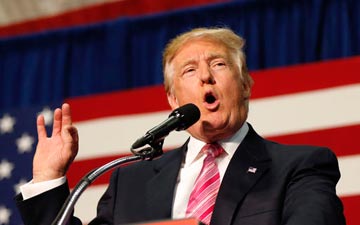
The Dangers of Political Speech
This article was originally published in Real Clear Politics on September 24, 2016.
Sticks and stones can break our bones—but words can also hurt us. This year’s presidential campaign has included push-back against political correctness and a rallying cry to get behind politicians who “tell it like it is.” However, words designed to evoke a violent reaction have no place in our political process. Campaign words matter.
Last Friday Donald Trump said, “I think that [Clinton’s] bodyguards should drop all weapons. Take their guns away. She doesn’t want guns … let’s see what happens to her. Take their guns away, OK? It’d be very dangerous.”
Last month, Trump suggested that “Second Amendment people” might be able to stop Hillary Clinton from selecting judges, leaving some with the impression that he was encouraging gun rights advocates to take violent action against her. In both instances the Trump camp walked back the comments, saying that is not what the candidate meant.
Intentional or not, Trump’s comments are incendiary “dog whistles”—veiled messages that are heard by unstable people, which can have a high likelihood of resulting in violence. Were these comments illegal threats? Obviously not. They were, however, reckless, irresponsible, and unethical.
Candidates for public office have the ear of the public. Their words are magnified due to the power of their position and coverage by the press. In some cases they acquire a cult-like following. In 2015, two Trump supporters acknowledged they were influenced by his rhetoric when they beat up a homeless Hispanic man with a pipe, saying, “Donald Trump was right. … All these illegals need to be deported."
In 2008, Hillary Clinton raised eyebrows -- and the blood pressure of the Secret Service -- when she carelessly said that she was staying in the primary because, in essence, you never know what might happen. She told the editorial board of The Sioux Falls Argus Leader, “We all remember Bobby Kennedy was assassinated in June in California.”
Fortunately, no unstable follower attempted to assassinate Barack Obama as a result of her words. In 2001, however, a paranoid schizophrenic in Arizona did open fire at a Tucson mall where Rep. Gabrielle Giffords was meeting constituents.
Six people were killed that day, including a federal judge, and Giffords was grievously wounded. The shooter, who gravitated toward conspiracy theories, had no rational motivations or even a discernable political ideology -- he obsessively disliked George W. Bush as well as Gabby Giffords -- but local law enforcement officials couldn’t help but wonder whether the reckless rhetoric of Gifford’s political opponents played a role in this tragedy.
That rhetoric included calling her “a target,” along with a graphic showing the cross hairs of a gun sight over a map including her district. Sarah Palin told Republicans they should “reload” with respect to targeted congressional districts.
As Pima County Sheriff Clarence Dupnik told the press at the time, “When you look at unbalanced people, how they respond to the vitriol that comes out of certain mouths about tearing down the government -- the anger, the hatred, the bigotry that goes on in this country is getting to be outrageous.”
“That may be free speech,” he added, “but it is not without consequences.”
Trump supporters argue that the current furor over Trump’s comments is just another example of suppressing free speech in favor of political correctness. It is not political correctness, however, to insist that candidates and their supporters be politically responsible. In this dangerous and highly flammable election environment, we must require our political leaders to anticipate the potential consequences of dangerous rhetoric and choose their words carefully.